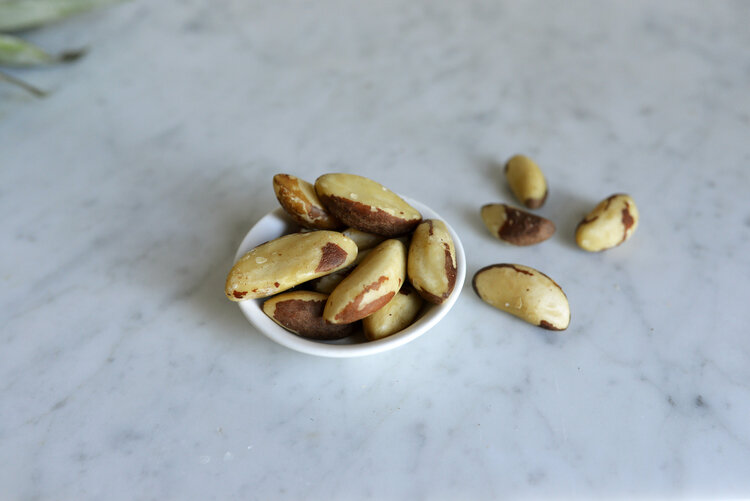Pineapple for Conception & Brazil Nuts for Implantation
In some trying-to-conceive circles, the foods to eat and foods to avoid can start to sound like folklore. It’s hard to know what might actually boost your chances and what’s a wild rumor. Pineapple and Brazil nuts are often suggested foods to aid conception and implantation, but an explanation as to why they might help rarely accompanies the recommendation.
Food and fertility are so closely intertwined, and nothing can replace a healthy diet and lifestyle before conception. If you are having difficulty conceiving or maintaining a pregnancy, these two foods may be worth a try, but it’s essential to consider your overall nutrition.
Pineapple
Pineapple contains the enzyme bromelain, which is well known for its powerful anti-inflammatory properties. As well as being able to alleviate pain and swelling in inflammatory-related conditions such as arthritis, bromelain can also reduce inflammation in the uterus.
A healthy egg, healthy sperm, and balanced hormones are all necessary for a successful pregnancy — but equally important is the condition and “receptivity” of the uterus. Recognized as the seed/soil relationship, a fertilized egg must embed itself in the wall of the uterus for implantation; however, chronic uterine inflammation is a known cause of implantation failure and early loss.
Other foods that can help reduce inflammation include turmeric, ginger, matcha tea, blueberries, wild salmon, dark leafy greens, and fermented vegetables.
Pineapple can also increase the quantity and quality of cervical mucus. Cervical mucus is the slippery, stretchy substance that keeps sperm nourished and mobile on their journey to the egg during your most fertile time of the month.
Sperm often die off in the acidic vaginal canal within the first 12 hours. However, in the alkaline cervical fluid conditions that occur around ovulation, sperm can often survive for 5 days or longer. Some internet sources warn against eating pineapple too early in your cycle because of the fruit’s known acidity. Although pineapple is acidic outside of the body, once it passes the stomach it actually becomes alkaline in the small intestine and can help to alkalize the vaginal canal. A proper pH balance in your body and vaginal canal not only nourishes sperm, but also contributes to overall health. To further balance the pH in your body, reduce alcohol, coffee, sugar, and refined grain products.
How much & when to eat?
The pineapple core is the most concentrated source of bromelain. Cut a whole pineapple into 5 slices widthwise, and remove the core from each section.
An egg lives for only 12–24 hours, but sperm can live up to 5 days in a woman’s body. So, consume one section of the core 4 days prior to ovulation and on the day of ovulation.
The pineapple should be eaten on an empty stomach for its anti-inflammatory properties; otherwise, bromelain acts as a digestive aid.
It must be fresh and raw — not canned or cooked.
Brazil Nuts
Brazil nuts are an incredible source of selenium, which is a mineral that helps to thicken the uterine wall — and a healthy lining greatly supports implantation.
Selenium also works as a mild anticoagulant that can increase blood flow to the uterus and ovaries, which may help increase the chance of conceiving.
The anticoagulant properties of selenium can also help prevent blood clotting. Sometimes, the lining of the uterus or a developing fetus can develop a blood clot, which may lead to an early miscarriage. For this reason, aspirin is commonly recommended to women who have suffered from multiple miscarriages, because aspirin thins the blood and can greatly reduce the likelihood of a clot developing.
Selenium also works as an antioxidant and can assist in creating a healthier environment for a developing egg by decreasing damaging free radicals in the body.
How much and when to eat?
A fertilized egg burrows into the uterine lining about a week after ovulation. To help support implantation, consume 2–3 Brazil nuts per day, starting from the day of ovulation until about 10 days post-ovulation.
Brazil nuts must be fresh and raw, not roasted or cooked, to preserve their full nutrient content.
Let’s support fertility journey — together
Small, intentional choices can make a big difference when it comes to nourishing fertility.
Become a Certified Nutrition Consultant and help guide women with evidence-based support as they prepare their bodies for conception.




